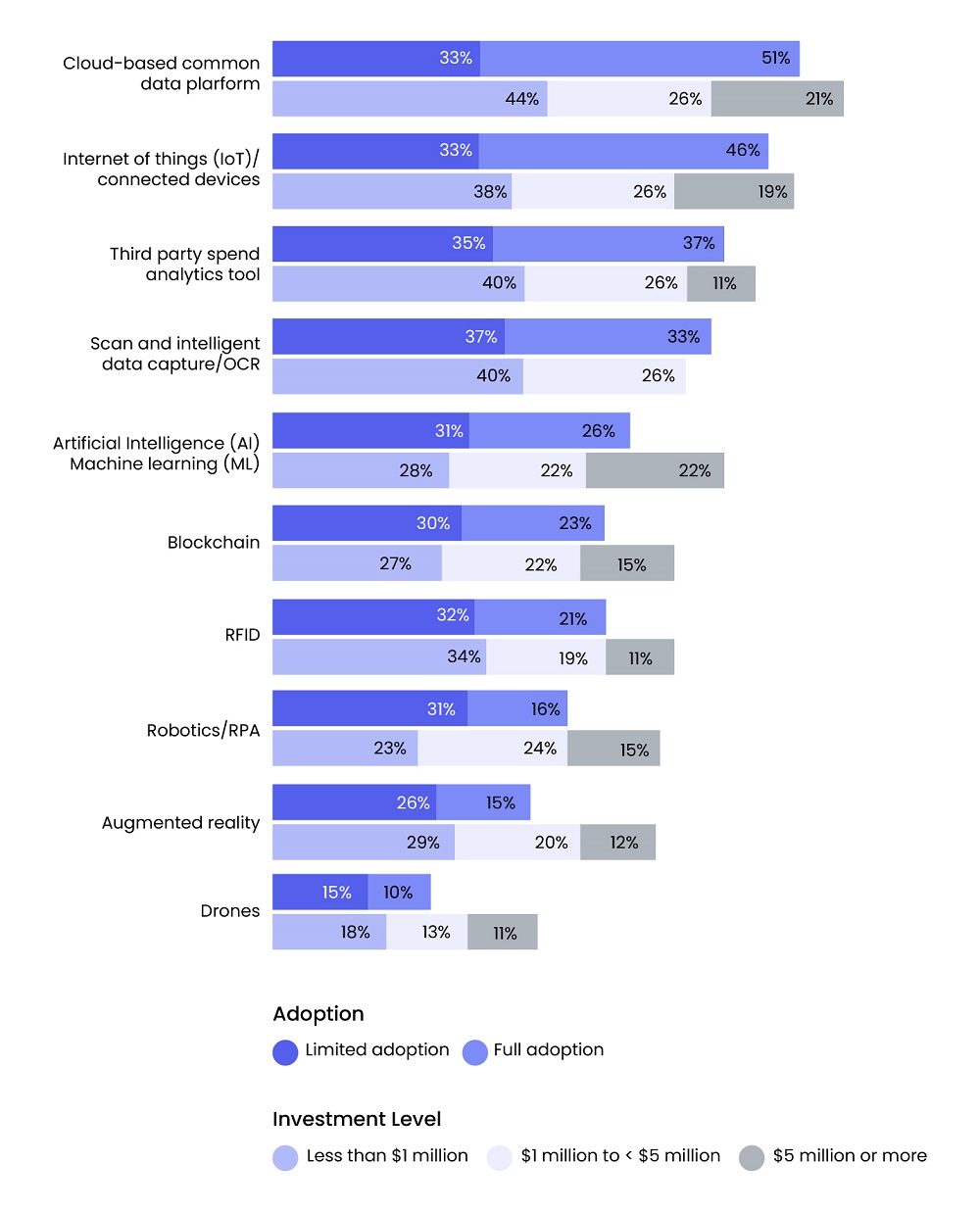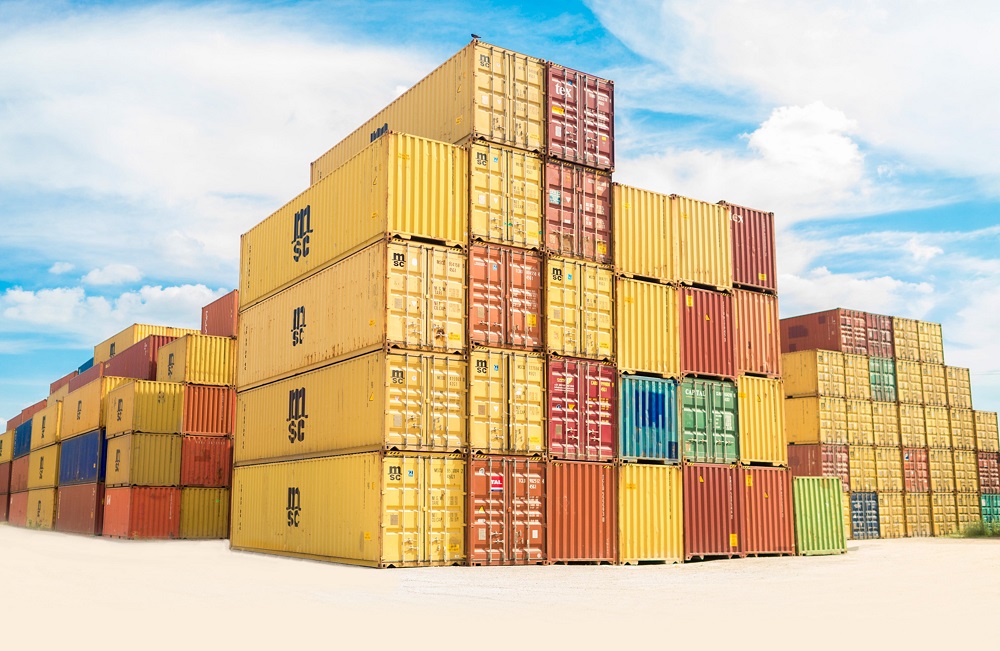Recent years have laid bare the fragile nature of global supply chains. As the world grappled with closed borders and lockdowns, innovative tech solutions provided a much-needed lifeline. While the worst is possibly behind us, the value of these technological innovations remains undiminished. The integration of technology ensures that efficiency, accuracy, and adaptability remain at the heart of global supply chains, paving the way for a smoother, more reliable flow of goods.
A 2022 Ernst & Young survey of senior-level supply chain executives across relevant sectors found that they planned to change their strategies by adopting technology like AI and automation. According to the 2023 Global Supply Chain Executive Report, 2 out of 3 businesses made proactive investments in supply chain technology, and 49% of the executives surveyed reported that their business gained over $1 million in additional revenue due to these investments.
Read more: Innovation in Defense Tech: Private Funding Opportunities on the Rise
Figure 1: Survey Results for Kind of Technology Adopted and Planned Investments

Source: PWC
Going forward, emerging technologies wield the power to exploit numerous opportunities as the complexities within the industry continue to grow.
Digital Twin Technology
Digital twin technology, while finding applications across industries, remains underutilized in supply chain management. A digital twin depicts a virtual representation of an intended or actual physical entity and uses multiple enabling technologies to optimize decision-making. They have the capability to provide an end-to-end representation of the complex supply chain that connects suppliers, warehouses, and distribution centers to customers. This technology learns and evolves from the real-time data collected, which enables it to identify bottlenecks, plan transportation, test warehouse designs, adjust inventory to align with demand and predict outcomes.
A survey by Gartner shows that 60% of Chief Supply Chain Officers plan to implement or are piloting a digital supply chain twin. The global courier delivery giant FedEx teamed up with Accenture and River Logic to create its digital twin technology to optimize routes and track shipments. German logistics company DHL is developing its digital twin technology to optimize and reduce transport flows. Food processing and packaging company Tetra Pak collaborated with Hexagon to implement the technology management of inventory and allocating warehouse equipment. As a result, the company has improved storage space utilization, enhanced workplace safety standards, and increased operational efficiency.
Read more: Navigating Supply Chain Challenges through Innovation and Investment
Freight Technology
Freight accounts for a sizable portion of supply chain activity; it is another space where the implementation of technology has been significantly impactful and is expected to grow. The value of freight within the United States is projected to grow from $1,001 per ton in 2023 to $1,256 per ton in 2050, adjusted for inflation, per the US Department of Transportation. Trucking within this represents the largest share; as of November 2023, it accounts for 63.5% of the total value of shipments made in the US. Consequently, investments made in autonomous trucking technology have been notable and represent 40% of investments made in freight tech to date, according to Pitchbook. California-based company Gatik has commercialized its self-driving trucks for Walmart in Arkansas and Loblaw in Ontario. The company claims to have eliminated 30% of its operating costs by removing human drivers. The global cargo shipping industry is projected to grow $4.2 trillion by 2031, and autonomous shipping startups have the potential to leverage this growth. Japan's Nippon Yusen Kaisha recently invested in Ghelia, founded at Sony CSL, for the development and advancement of the use of AI in shipping. Freight technology isn't restricted to autonomous vehicles; logistics software and applications that deploy AI and predictive systems are set to make a great impact. Flexport, another California-based firm, optimizes and analyzes its client's supply chain using its software to shorten delivery timelines and cut down on late fees. Recently, the company acquired the technology of another freight business.

Supply Chain Visibility Technology
Supply chain visibility technology provides an end-to-end view of the process from the raw materials all the way through to the customers. Visibility is crucial for the efficient functioning of a company, but the growing geographical and operational complexities make it a challenging task. Project44’s proprietary generative AI model, Movement GPT, navigates these challenges via its large dataset gathered from tracking one billion shipments representing $1tn in customer inventory across 181 countries. FY2023, as the company reported, was a resounding success with an increase in GAAP revenue by 51% and a $2.7 billion valuation. FourKites, a Chicago-based company, provides customers with real-time visibility and predictive outcomes. The company has experienced a 37% year-on-year increase in its customer base and a 40% growth in the number of shipments.
Like all sectors, the supply chain technology landscape, too, is facing the burn of a dimming investment climate compared to recent years. In 2021, the industry saw a frenzy of investments into startups aiming to address the loopholes highlighted by the pandemic. There have been notable trends and emerging opportunities for the market in the cooldown since. A shift in focus to account for various possible scenarios has been crucial to creating resilient systems able to foresee and control any shocks to the market. Supply chain tech has been key to enabling this shift, and technologies like digital twins, freight tech, and supply chain software are emerging as vital opportunities.
Read more: Investment Outlook: Private Equity Market Trends 2023
SG Analytics, recognized by the Financial Times as one of APAC's fastest-growing firms, is a prominent insights and analytics company specializing in data-centric research and contextual analytics. Operating globally across the US, UK, Poland, Switzerland, and India, we expertly guide data from inception to transform it into invaluable insights using our knowledge-driven ecosystem, results-focused solutions, and advanced technology platform. Our distinguished clientele, including Fortune 500 giants, attests to our mastery of harnessing data with purpose and merging content and context to overcome business challenges. With our Brand Promise of "Life's Possible," we consistently deliver enduring value, ensuring the utmost client delight.
Partner of choice for lower middle market-focused Investment Banks and Private Equity firms, SG Analytics provides offshore analysts to support across the deal life cycle. Our complimentary access to a full back-office research ecosystem (database access, graphics team, sector & and domain experts, and technology-driven automation of tactical processes) positions our clients to win more deal mandates and execute these deals in the most efficient manner.









